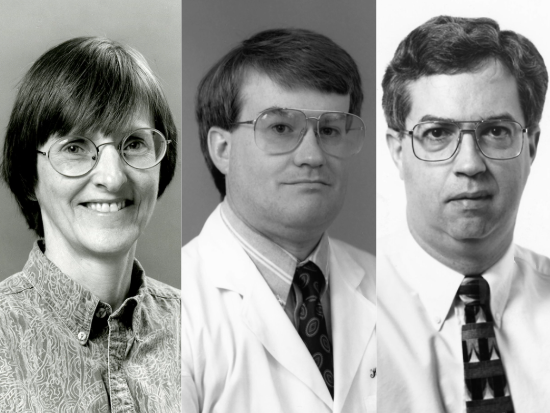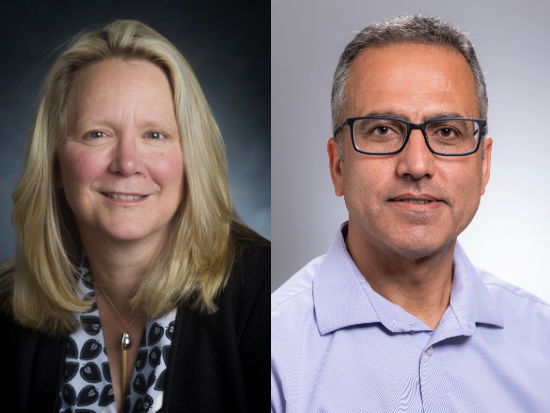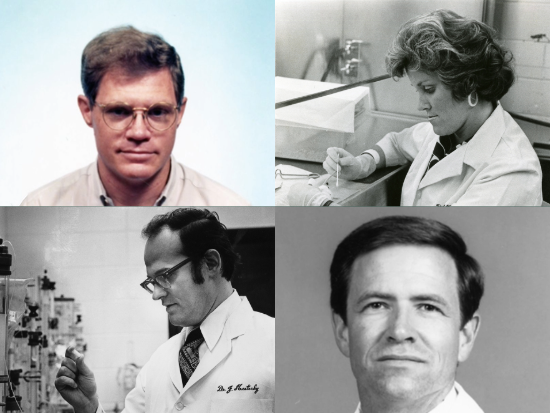 Suzanne M. Michalek, Ph.D., Ken B. Waites, M.D., FAAM, David Chaplin, M.D., Ph.D. In the midst of the HIV/AIDS epidemic, the UAB Department of Microbiology emerged as a leading force, driving groundbreaking research and response efforts. However, the department's influence over the next few decades, specifically from the late 1990s through present-day, extended far beyond this global crisis, as it also made remarkable advancements in other key areas of scientific research and public health.
Suzanne M. Michalek, Ph.D., Ken B. Waites, M.D., FAAM, David Chaplin, M.D., Ph.D. In the midst of the HIV/AIDS epidemic, the UAB Department of Microbiology emerged as a leading force, driving groundbreaking research and response efforts. However, the department's influence over the next few decades, specifically from the late 1990s through present-day, extended far beyond this global crisis, as it also made remarkable advancements in other key areas of scientific research and public health.
“This period was often regarded as the department’s second Renaissance,” said Jamil Saad, Ph.D., professor in the Department of Microbiology. “It was a time of profound transformation and collaboration across multiple programs, leading to significant progress on many fronts.”
The Heersink School of Medicine communications team sat with Saad, Suzanne M. Michalek, Ph.D., Emeritus Professor in the Department of Microbiology and a member of the Microbiome Center and the Immunology Institute, David Chaplin, M.D., Ph.D., Emeritus Professor and previous chair in the Department of Microbiology, and Frances Lund, Ph.D., professor, previous chair in the Department of Microbiology, and the Endowed Chair in Immunology in the UAB Immunology Institute, to learn more about other areas researched by the department during this era.
Mucosal immunology
In recognizing the pivotal role that mucosal immunology plays in understanding and combating diseases like HIV, particularly from the late 1990s to today, UAB has distinguished itself as a leader in this field.
"Thanks to research efforts over the past three decades, UAB now has the most well-known mucosal immunology program," Chaplin said. "It is arguably the crown jewel of our research efforts."
Many may not realize that HIV is a mucosal infection that impacts the body's mucous membranes in the mouth, genitals, digestive tract, eyes, and nasal passages. This connection made mucosal immunology—the study of how the immune system responds to mucosal surfaces such as the intestines, respiratory system, and urogenital tract—a critical area of focus in HIV research at UAB.
According to Michalek, Jiri Mestecky, M.D., Ph.D., Professor in the Department of Microbiology, Jerry McGhee, Ph.D., and herself were the key figures who initiated Mucosal Immunology Research in the Department of Microbiology. Their research in mucosal immunology and mucosal vaccine development contributed to the first mucosal studies of HIV/AIDS through the UAB Mucosal HIV & Immunobiology Center.
This institute was designed to facilitate collaborations among researchers and foster interactions and collaborations, leading to groundbreaking discoveries in mucosal immunology and beyond. The impact of UAB's research in this area continues to shape the future of immunology and global health. To further enhance collaborative and innovative basic and translational research in immunology, the UAB Heersink School of Medicine established the Immunology Institute in 2021, under the leadership of Director Lund.
 Frances Lund, Ph.D. and Jamil Saad, Ph.D.Streptococcus and mycoplasma pneumonia
Frances Lund, Ph.D. and Jamil Saad, Ph.D.Streptococcus and mycoplasma pneumonia
In the late 1990s, the department had made significant strides in understanding and combating pneumonia, with a particular focus on Streptococcus pneumoniae and Mycoplasma pneumoniae, two of the leading causes of this condition.
According to Chaplin, David Briles, Ph.D., was instrumental in establishing the Streptococcus pneumoniae program at UAB from 1980 to 2010. His research, along with contributions from his colleagues like Janet Yother, Ph.D. (his former trainee, now Professor of Microbiology), Susan Hollingshead, Ph.D. (former Professor of Microbiology), Marilyn Crain, M.D. (Professor of Medicine, UAB Division of Infectious Diseases), has greatly enhanced the understanding of Streptococcus pneumoniae, particularly its mechanisms and the severe damage it can cause to various organs, especially the heart.
“This research has been crucial in advancing the medical community's approach to preventing and treating infection by Streptococcus pneumoniae,” Chaplin said.
Gail Cassell, Ph.D., former chair of the Department of Microbiology from 1987 to 1997, played a key role in advancing research on Mycoplasma pneumoniae, the other bacterium responsible for the majority of cases of community-acquired pneumonia.
Cassell’s research team included notable investigators such as Prescott Atkinson, M.D., in the Department of Pediatrics, Ken B. Waites, M.D., FAAM, in the Department of Pathology, and others who have made significant contributions to understanding the impact of Mycoplasma pneumoniae on human health. Their work has provided valuable insights into the bacterium's behavior, transmission, and the damage it can cause, particularly in vulnerable populations.
Under her leadership, the department launched the Gail Cassell Microbiology Research Retreat dedicated to this and other research in the Department of Microbiology, which has since become a cornerstone of UAB's efforts to combat pneumonia and other infectious diseases.
The research conducted by these pioneering scientists has not only deepened the medical community's understanding of pneumonia but has also paved the way for new treatments and preventative measures that continue to save lives today.
Tuberculosis
Since 2004, the department has made groundbreaking contributions to the study of tuberculosis (TB), addressing critical aspects of its biology and antibiotic resistance.
Michael Niederweis, Ph.D., professor in the Department of Microbiology, made a pivotal discovery regarding the outer membrane of Mycobacterium tuberculosis, the bacterium responsible for TB. His research unveiled how this membrane contributes to the bacterium's high level of antibiotic resistance, a major challenge in treating TB effectively. This discovery has had profound implications for developing new strategies to combat TB and improve treatment outcomes.
Andries Steyn, Ph.D., professor in the Department of Microbiology, focused on the biological aspects of tuberculosis infection, with particular attention to the intersection of TB and HIV. Steyn's research highlighted that individuals with HIV are particularly susceptible to developing tuberculosis, and the combination of these two diseases presents a significant health challenge, especially in regions like South Africa where the burden is particularly severe. His work has been instrumental in understanding the complex interactions between these infections and in developing targeted interventions to address this pressing global issue.
Together, Neiderweis’s and Steyn's research contributions have deepened our understanding of tuberculosis and its interactions with other conditions, providing crucial insights that continue to inform public health strategies and treatment approaches worldwide.
 David Briles, Ph.D., Gail Cassell, Ph.D., Jiri Mestecky, M.D., Ph.D., Prescott Atkinson, M.D.Other discoveries
David Briles, Ph.D., Gail Cassell, Ph.D., Jiri Mestecky, M.D., Ph.D., Prescott Atkinson, M.D.Other discoveries
Reverse genetic system for RSV
From 1990 to 2005, the UAB Department of Microbiology has been at the forefront of several groundbreaking discoveries, particularly in the field of virology.
Gail Wertz, Ph.D., and L. Andrew Ball, Ph.D., both are Emeritus Professors in the Department of Microbiology. They are highly accomplished virologists and were among the first to develop reverse genetic systems for studying negative-strand RNA viruses, such as influenza and respiratory syncytial virus (RSV). In their own laboratories, they pioneered this system, revolutionizing the study of these viruses.
Developing the reverse genetic system was a significant leap forward, allowing researchers to investigate how these viruses cause infection and the subsequent changes they induce in the host, leading to disease. This innovation also opened the door to identifying two key proteins that should be targeted in developing vaccines, marking a critical advancement in the fight against these pervasive viral infections.
Their work has deepened the understanding of how negative-strand RNA viruses operate and paved the way for more effective vaccines and treatments, continuing to influence virology research and public health efforts globally.
Software tools and the study of COVID-19
Elliot Lefkowitz, Ph.D., professor in the Department of Microbiology, has been a pivotal figure in the study of viruses at UAB, particularly in the realm of bioinformatics. As the Director of Informatics for the Center for Clinical and Translational Science, the Molecular and Genetic Bioinformatics Facility at the Center for AIDS Research, and the Bioinformatics Core at the Microbiome Center, Lefkowitz has significantly advanced the use of software tools in virology research.
Chaplin shared that Lefkowitz “created a valuable resource with information about viruses and developing different software and tools that enhanced the study of COVID-19." Lefkowitz’s work was instrumental in enabling researchers to analyze and track the virus during the pandemic.
Lefkowitz also founded the Bioinformatics Research Center, the first informatics program of its kind funded by the NIH.
"He developed it into something that was truly a valuable resource for the broad scientific community," Chaplin added. “The tools and resources Lefkowitz developed are still in use today, not only in tracking COVID-19 but also in monitoring other viral outbreaks, such as influenza.”
Lefkowitz’s contributions have impacted the scientific community, providing essential tools supporting vital research and public health efforts worldwide.
The legacy of the UAB Department of Microbiology during this era is marked by groundbreaking research and collaboration that not only addressed critical global health challenges but also paved the way for continued innovation in the field.
Stay tuned for part 3 of this series, during which we’ll explore the UAB Department of Microbiology’s present-day highlights and vision for the future.